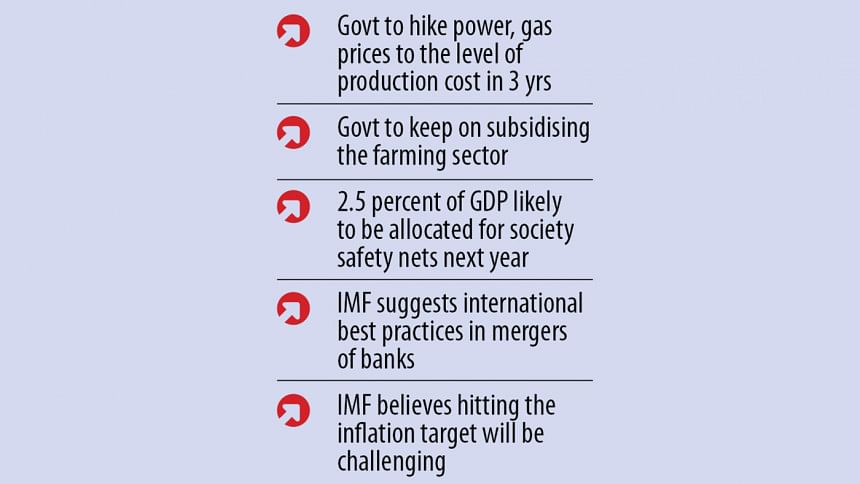IMF suggests raising power, gas and fertiliser prices

The International Monetary Fund yesterday recommended reducing government subsidies by hiking prices of power, gas and fertiliser, and spending the saved money on society safety net programmes.
The visiting IMF mission, during a meeting with finance ministry officials, also recommended the inclusion of more poor people in the programmes and better monthly allowances for them.
The mission, led by Chris Papageorgiou, held a series of meetings with the officials of the Finance Division and the Financial Institutions Division yesterday. It also discussed the government's macroeconomic framework, implementation of laws related to the banking sector and financial institutions, classified loans, and Bangladesh Bank's move to merge banks.

Finance ministry officials said the government has decided to gradually hike the prices of power and gas over the next three years to the level of their production costs.
The measures would be implemented so that the government does not have to subsidise the sectors, said an official. The official, however, said the government has no plans now to increase fertiliser prices.
The IMF mission during a meeting with the Finance Division was told that the government would continue subsidising the agriculture sector.
After entering into the IMF's $4.7 billion loan programme in January last year, the government hiked the prices of electricity and gas several times. It had increased the price of urea fertiliser by 5 percent in August 2022, after 11 years.
Since the 2022-23 fiscal year, the government's subsidy on electricity, gas and fertiliser nearly doubled.
In the current fiscal year, subsidy allocation is Tk 84,542 crore and it could be about the same next year, Finance Division officials told the IMF mission.
The IMF wanted to know whether the government had any plans to increase allowance for the poor under social safety net programmes and what the government was planning next regarding the programmes.
Officials told the mission that they were going to increase the number of beneficiaries by around five lakh but there were no plans to improve the allowances due to fund constraints.
About 58 lakh elderly people are getting Tk 600 per month in the current fiscal year. Their number will be increased by two lakh in the next fiscal year.
All eligible senior citizens are getting the benefit in 262 upazilas. All eligible individuals in the remaining 233 upazilas will be brought under the scheme gradually.
The officials said about 2.5 percent of the GDP would be allocated for society safety net programmes next fiscal year.
The finance ministry issued two circulars to bring all safety net programmes under a new structure to reduce waste, misuse, and corruption.
The IMF mission, during its meeting with the Financial Institutions Division officials, said it supported the policy of merging banks and laid importance on following international best practices while implementing the move. It said India took a similar move and it yielded good results.
The IMF mission recommended reducing state-owned banks' classified loans to 10 percent from over 20 percent and wanted to know what action the government was taking against wilful loan defaulters, meeting sources said.
The officials told the mission that commercial banks would send lists of wilful defaulters to the central bank and the central bank would take action as per the bank company law.
During another meeting, the Finance Division presented the country's macroeconomic projection before the IMF mission, sources said.
The officials told the IMF mission that they revised the GDP growth to 6.5 percent from 7.5 percent for the current fiscal year. The inflation target was revised to 8 percent from 6.5 percent.
The next fiscal year's GDP growth target is 6.75 percent and the inflation target is 6.5 percent, they said.
The IMF said the targets were challenging and laid importance on introducing market-based interest and exchange rates.
The IMF mission is in Dhaka for its second review of the $4.7 billion loan programme before releasing the third tranche. Since it approved the loan in January last year, the multilateral lender has released $1.16 billion in two tranches. The release of the third tranche would depend on the outcome of this visit.

 For all latest news, follow The Daily Star's Google News channel.
For all latest news, follow The Daily Star's Google News channel. 



Comments